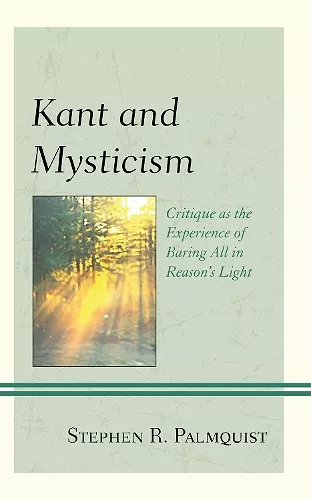Kant and Mysticism
Critique as the Experience of Baring All in Reason's Light
Format:Hardback
Publisher:Lexington Books
Published:10th Jul '19
Currently unavailable, and unfortunately no date known when it will be back
This hardback is available in another edition too:
- Paperback£35.00(9781793604668)

What is happening when someone has a mystical experience, such as “feeling at one with the universe” or “hearing God’s voice?” Does philosophy provide tools for assessing such claims? Which claims can be dismissed as delusions and which ones convey genuine truths that might be universally meaningful? Valuable insights into such pressing questions can be found in the writings of Immanuel Kant, though few philosophical commentators have appreciated the implications beyond his famous “Copernican hypothesis.” In Kant and Mysticism, Stephen R. Palmquist corrects this skewed view of Kant once and for all. Beginning with a detailed analysis of Kant’s 1766 work Dreams of a Spirit-Seer, Palmquist demonstrates that in Dreams Kant first discovers and explains his plan to write a new, “critical” philosophy that will revolutionize metaphysics by laying bare the limits of human reason. Palmquist shows how the same metaphorical relationship—between reason’s dreams (metaphysics) and sensibility’s dreams (mysticism)—permeates Kant’s mature writings. After clarifying how Kant’s final (unfinished) book, Opus Postumum, completes this dual project, Palmquist explains how the “critical mysticism” entailed by Kant’s position has profound implications for contemporary understandings of religious and mystical experience, both by religious individuals and by philosophers seeking to understand such experiences.
Kant’s Dreams of a Spirit-Seer, his early sardonic critique of the Swedish mystic Emanuel Swedenborg, is often taken as an odd and unimportant episode in the development of Kant’s Critical philosophy. But Stephen Palmquist convincingly shows that Kant was significantly influenced by Swedenborg’s writings, borrowing elements of epistemology, ethics, and religious thinking from Swedenborg. Palmquist’s work also profoundly deepens our understanding of the extent to which a mysticism of reason lies at the heart of Kant’s whole Critical philosophy. -- Ronald M. Green, Dartmouth College
ISBN: 9781793604644
Dimensions: 229mm x 161mm x 20mm
Weight: 454g
182 pages